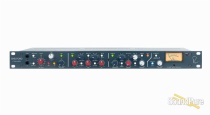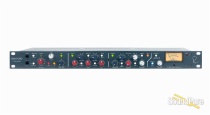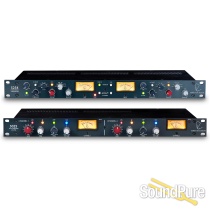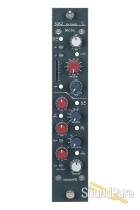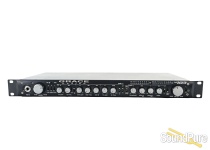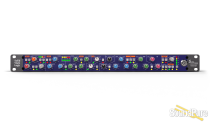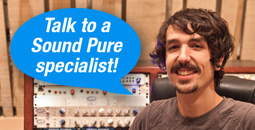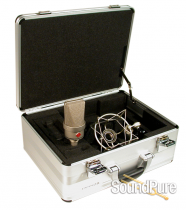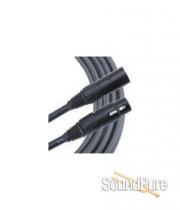For recording and mixing engineers, the greatest challenge will always be to capture and transform disparate 2-D elements into an engrossing 3-D vision that elicits the same raw emotions and compelling vibrance as the live performance. In designing the Portico II Channel Strip, every possible attention has been paid towards not only producing the most accurate, sweet sounding audio topologies, but also enabling engineers to boldly shape or fine tune tracks to the limit of their imaginations.
A self-powered 2U channel module comprised of a fully- featured mic preamplifier, 4-band EQ, compressor-limiter, "texture" control and level metering, The Portico II Channel includes a bevy of new features including: Variable Silk / Silk+ Texture control, a fully tunable "de-esser", multiple VCA filtering and detection options, a transient-optimized swept HPF and parallel compression blending. With its simple yet powerful topologies and extensive feature set, every element of the Portico II: Channel is geared towards empowering recording artists to realize these visions.
Input Section
Input signals may be derived from any of three sources; Microphone, Line or DI. The Microphone input has a 10K non-reactive input resistance that handles a full 26dBu signal without the need for a pad. A primary Gain control provides 66dB of gain in 6dB increments for easy recall with a +/- 6dB Trim for fine adjustment. A transient-optimized HPF continuously covering the range from 20-250Hz is included. In addition the usual 48V Phantom Power switch, Phase Inversion, Signal Present indicator and a Mute switch are included. The pre-amp is a TLA non-reactive design that precludes the loading of microphones with limited driving capability and which maintains a 2 dB noise figure over a wide range.
Inserting a plug into the DI input, selects a 3M Discrete FET DI circuit that includes the transformer-coupled pristine topography that optimizes both the microphone and DI inputs, allowing low impedance microphones and high impedance sources like electric guitars and basses to deliver their optimum performance. Primary Gain and Trim controls are fully operational. A "Thru" jack on the front panel that duplicates the unaffected source signal allows the use of an external amplifier if required. A "Line" switch selects the independent Line XLR non-reactive input circuit that includes the HPF and Level trim controls.
Texture
One of the key developments in the Portico II is the new Texture section. Building on the "Silk" mode found in the Portico Series mic pre-amplifiers, Texture is designed to adjust the actual amount of harmonic music content from the source material, in effect, providing countless tonal options in one device. The texture section features distinct modes, controlled by a potentiometer from barely audible to dramatic! With that said, we have placed great care insuring that the musical integrity of source material itself will not be compromised by these harmonic controls (these are not to be confused with controls from other manufactures that may "incinerate", "demolish" or "destroy" source material), and we believe they can be confidently modified to fit the personality of any song, instrument or engineer.
Like the original Portico, Silk mode works by reducing negative feedback on the output transformer and adjusting the frequency response to more closely resemble Mr. Rupert Neve's vintage designs. "Silk +" mode pushes this technique still further, achieving a more harmonically rich sound.
Equalizer
The EQ topologies in the 4-Band Equalizer of the Portico II combine the best-loved sound of several classic designs, but are also capable of extremely fine surgical adjustments as well as dramatic boosts or cuts. By default, the EQ section follows the mic preamplifier and HPF, and precedes the compressor, but this sequence may be reversed by engaging the Post Comp switch
The Low Shelf has an independent engage switch, Classic Peak/ Accelerated Shelf selection, with +/- 12dB level adjustment, and selectable turnover frequencies of 35, 60, 100, and 220 Hz. The Fully Parametric LMF and HMF bands have a joint engage switch, providing +/- 12dB level adjustment, continuously variable "Q" from 0.7 to 5 and continuously variable frequency ranges from 70 to 1.4KHz and 700Hz to 14KHz. In addition to its standard capabilities, the HMF band can also be used to precisely tune a new De-Esser circuit.
The De-Esser can be varied from off to full effect, and uses the Frequency, and "Q" controls to tame harsh sibilance in vocals and instruments with an independent high-mid limiter. Even when the De-Esser is on, the EQ level may still be used. The High Frequency shelf has independent engage switch, Classic Peak/ Accelerated Shelf selection, +/- 12dB level adjustment, and selectable turnover frequencies of 4.7, 6.8, 12, and 25kHz. When two Portico II Channels are used side by side, the EQ section can also excel at stereo material.
Compressor
A further array of tools are used to craft dynamic response. The Portico II's compressor section is exceptionally flexible. Like the Portico 5043, the compressor a choice of Feed-Forward / Feed-Back modes, either providing a transparent modern response (FF), or a smoother more musical vintage response (FB). Along with FF/FB modes, there are also 1:1 to 40:1 ratio controls and threshold from -30dBu to +20dBu, together with Attack from 20 to 75ms (.1 ms in Peak mode), Release from 100ms to 2.5s, and Make up gain from 0 to 20dB with a Stereo Link.
The Portico II compressor however incorporates a number of new ways to tame and enhance dynamics. HPF to SC inserts the High Pass Filter into the side chain to deal with intense low frequencies that may skew the response of the VCA with certain songs and instruments. The "Peak" switch alters the compressor’s attack to react to transients with a roughly .1ms response time. When "peak" is disengaged, the compressor responds to the RMS signal in conjunction with the attack and release settings.
"Blend" works by creating a parallel mix between the compressed and dry signals. By mixing the compressed and dry signals, it is possible to increase the volume of quieter elements in the source material (for instance, delicate snare brushing on a track with much louder hits), while maintaining a natural dynamic feel for the louder elements.
To further control the side chain, there is also an insert "send" and "return" that may be paired with an external EQ or other filters for additional manipulation. The "return" may also be used as a "Key" input for ducking one signal under another. (for instance, a voice-over keying the compressor to duck a background music track). By connecting the "link" jack on the back of the Portico II to another Portico II link jack and engaging the Link buttons, the compressor section may be used for stereo material.





